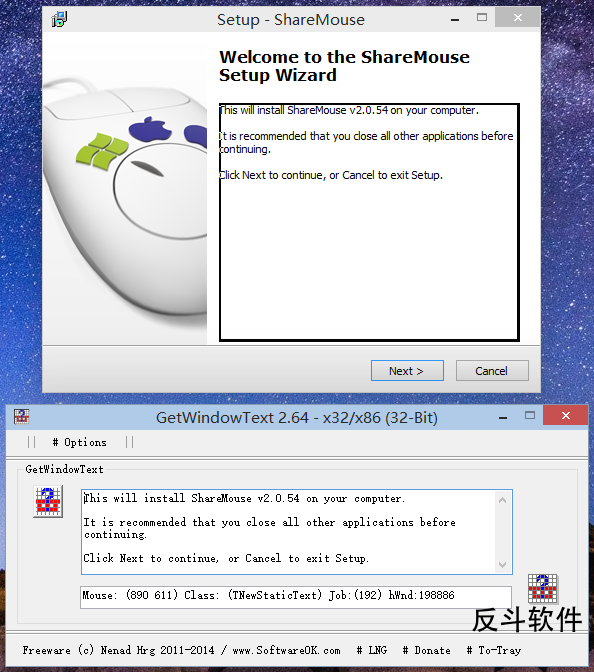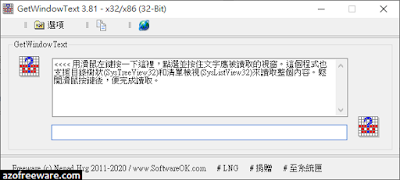

Through them, searching for an existing file built of these components: List of languages, which will be split on the colon to produce the expected listįind() then expands and normalizes the languages, and then iterates The environment variables should contain a colon separated

The first one returning a non-empty value is used for the Searched: LANGUAGE, LC_ALL, LC_MESSAGES, and If localedir is not given, then the default system locale directory is used.Ģ If languages is not given, then the following environment variables are Strings, where each string is a language code. Takes a domain, identical to what textdomain() takes. find ( domain, localedir = None, languages = None, all = False ) ¶
#Getwindowtext python install
Install themselves in the built-in namespace as the function _(). mo formatįiles, and has methods for returning strings. gettext definesĪ GNUTranslations class which implements the parsing of GNU. Way of localizing your Python applications and modules. Greater convenience than the GNU gettext API. The class-based API of the gettext module gives you more flexibility and print ( _ ( 'This is a translatable string.' )) Class-based API ¶ textdomain ( 'myapplication' ) _ = gettext. bindtextdomain ( 'myapplication', '/path/to/my/language/directory' ) gettext. Is, gettext(), dgettext(), ngettext(), dngettext()),īut the translation is restricted to the given message context. Similar to the corresponding functions without the p in the prefix (that dnpgettext ( domain, context, singular, plural, n ) ¶ npgettext ( context, singular, plural, n ) ¶ gettext. dpgettext ( domain, context, message ) ¶ gettext. Like ngettext(), but look the message up in the specified domain. dngettext ( domain, singular, plural, n ) ¶ po files and theįormulas for a variety of languages.
#Getwindowtext python free
It is a C or PythonĮxpression that has a free variable n the expression evaluates to the indexįor the precise syntax to be used in. The Plural formula is taken from the catalog header. Singular if n is 1 return plural otherwise. Languages have more than two plural forms). If a translation is found,Īpply the plural formula to n, and return the resulting message (some Like gettext(), but consider plural forms. Like gettext(), but look the message up in the specified domain. _() in the local namespace (see examples below). Return the localized translation of message, based on the current globalĭomain, language, and locale directory. If domain is None, then theĬurrent global domain is returned, otherwise the global domain is set toĭomain, which is returned. textdomain ( domain = None ) ¶Ĭhange or query the current global domain.

If codeset is omitted, then the current binding is returned.ĭeprecated since version 3.8, removed in version 3.10. Returned by the lgettext(), ldgettext(), lngettext() bind_textdomain_codeset ( domain, codeset = None ) ¶īind the domain to codeset, changing the encoding of byte strings If localedir is omitted or None, then the current binding for domain is LC_ALL, LC_MESSAGES, and LANG respectively. Language is searched for in the environment variables LANGUAGE, The path (on Unix): localedir / language /LC_MESSAGES/ domain. bindtextdomain ( domain, localedir = None ) ¶īind the domain to the locale directory localedir. If you are localizing a Python module, or if yourĪpplication needs to switch languages on the fly, you probably want to use theĬlass-based API instead. Your application is monolingual, with the choice of language dependent on the Translation of your entire application globally. The gettext module defines the following API, which is very similar to Some hints on localizing your Python modules and applications are also given. Provide a catalog of translated messages for running under different natural To write your module and application messages in one natural language, and GNU gettext message catalog API and a higher level, class-based API that mayīe more appropriate for Python files. (L10N) services for your Python modules and applications. The gettext module provides internationalization (I18N) and localization Unicode character, trailing characters will be ignored.Gettext - Multilingual internationalization services ¶ Character literals #Ĭ++ functions that accept character literals as input will receive the firstĬharacter of a Python str as their input. UTF-8/16/32 before being returned to Python. Strings in multibyte encodings such as Shift-JIS must transcoded to a def ( "set_window_text", ( HWND hwnd, std :: wstring s ) )


 0 kommentar(er)
0 kommentar(er)
